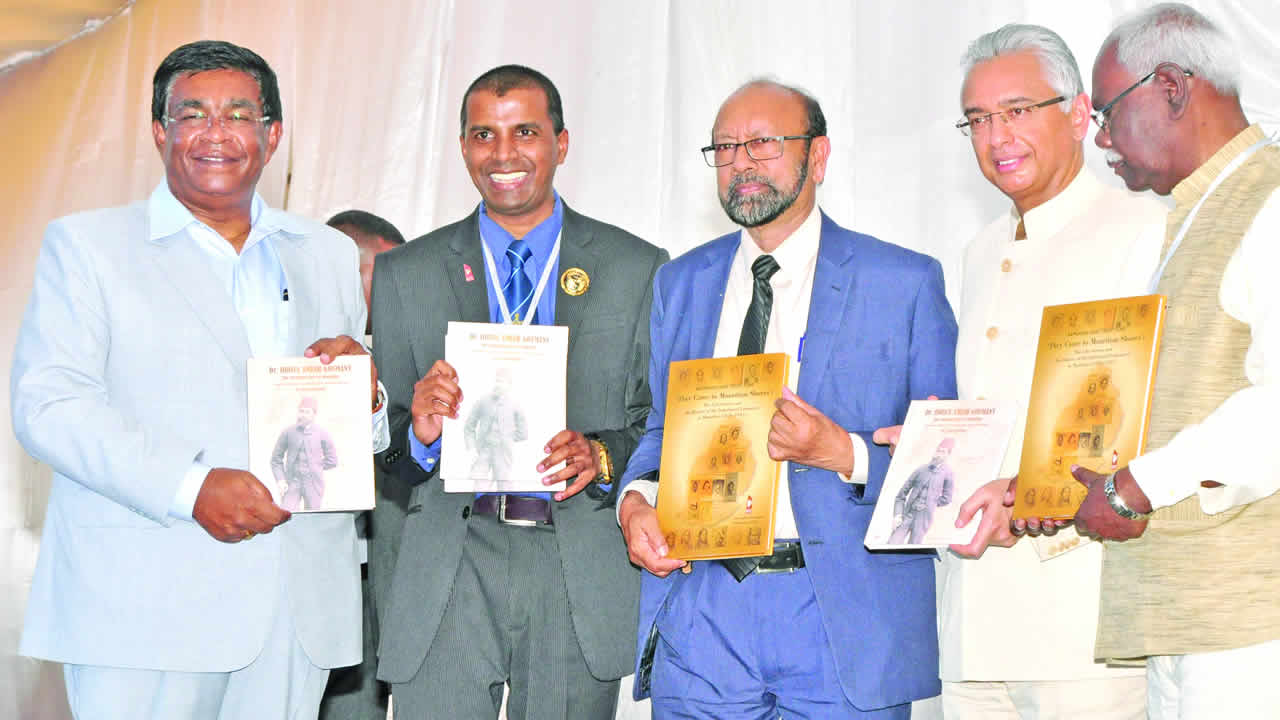
The presentation of Assad Bhuglah’s book entitled “Dr Idrice Ameer Goumany: The Forgotten Hero of Mauritius” took place last Friday at the seat of the Islamic Cultural Centre (ICC) in Port Louis. Through this book, the author intends that the contributions of Dr Idrice Goumany obtain its due recognition at national level.
“…On 29 July 1889, while the Chief Medical Officer was apprising the members of the Health Commission, in the presence of Assen Goumany, of the fact that the health of Dr Idrice Goumany was showing some improvement, a male nurse suddenly rushed into the office to announce the demise of Dr. Goumany…”
This was the fate of the doctor who died on 28 July 1889, while he was still on duty, busy saving the lives of others at a period when the island was devastated by small-pox. “Initially, my effort was simply an advocacy role to get the contributions of Dr Idrice Goumany recognised at national level. I found it very sad that this young doctor, who sacrificed his life while saving the lives of patients infected by the deadly disease of small pox, particularly the Indian indentured labourers, was flatly ignored in all the national celebrations relating to the arrival of Indian immigrants,” claims the author Assad Bhuglah.
With the aim of sensitizing public opinion on the contributions of Dr Goumany, Assad Bhuglah wrote several articles in local newspapers but claimed that the idea of writing a book never crossed his mind. “It was Mr Carrim Currimjee who requested me to write a book on this illustrious personality so that the present and coming generations will be proud of the heroic and patriotic actions of this eminent son of a humble ‘lascar’,” he adds.
Hence, for the past three years, the sentiment of writing the book had been overwhelming and he kept wondering whether there would be enough materials to cover the life of a person who died at a very young age and who had exercised his profession for only three years. The author was surprised that many Mauritians had limited knowledge about the fact that Dr Idrice Goumany was among the first Muslim doctors and that he was the sole Indo-Mauritian in the list of doctors published by the colonial gazette of 1887.
Parts of immigration history ignored
Assad Bhuglah’s book also lays emphasis on the Indian Diaspora in Mauritius starting as far back as 1735, which accounts to almost 283 years of history. However, it should be noted that the Aapravasi limits itself to 1834 or rather a period of 183 years. Parts of our immigration history have hence been ignored. “Mauritius is an island of immigrants. It will be unfortunate to have our history fractured among different components of our society.
It would have been ideal if all immigrants, irrespective of whether they are descendants of French, ‘Lascars’, Tamils, Coolies, Gujratis, Merchants, Chinese or slaves, join hands to celebrate one single national event on immigration saga,” he states. “All of them climbed the same staircase of the Immigration depot. It must also be pointed out that the geographical coverage of the origin of the Indian Diaspora is much larger than the frontiers of the Indian sub-continent.”
In addition, the book has a subtitle: “A short-lived blossom of an emerging society.” According to the author, the ‘emerging society’ refers to the community life of the ‘lascars’ who were settling down in Mauritius at that time. “Within a matter of two generations, they were able to organize themselves into ’congregations’, exercise their influence over the French governors and get permission to build the first mosque.
Through their hard work, they were able to save money, buy properties and finance the education of their children,” points out Assad Bhuglah. On the other hand, the ‘short-lived blossom’ evidently refers to Dr Idrice Goumany. He bloomed hardly for three years as a doctor. “Had he lived longer, he would have definitely played a leadership role in the Muslim community. This is evidenced from his various moves made after his return from Scotland. He was instrumental in addressing petitions to the British imperial authorities. He was very much concerned with the cultural, economic and political conditions of his people.”
Otherwise, the author sheds light on the examples set by Dr Idrice Goumany and their relevance in today’s context. According to him, there are some universal values, which form the bedrock of Islamic culture and that can be drawn from the life of Dr Idrice Goumany. “These are hard work and sacrifices, self-discipline, travelling to foreign lands in search of knowledge, commitment to duty and services to others. The life story of Dr Goumany shows the dynamism and energy of a people who want to forge ahead,” highlights Assad Bhuglah.
About the author

Assad Bhuglah is an economist by profession and a specialist in International trade. He served for more than 30 years as a trade expert for the government of Mauritius before retiring in 2016. He represented Mauritius as a lead trade negotiator in various regional and international fora. In 2004, he wrote a book entitled “A Handbook of Trade Negotiations for Small Island Developing States” in the context of a project of UNDP/University of West Indies.
Assad Bhuglah has been actively involved in social and cultural activities since his early youth. He had been editor of various magazines namely ‘Camp des Lascars Al Aqsa Mosque Through History’ published in 1984. He is currently a Board member of the Islamic Cultural Centre Trust Fund where he has the special responsibility of piloting projects activities related to Arts and Culture.
He is equally a freelance writer and contributes regularly to Star newspaper and Le Mauricien.
 J'aime
J'aime














